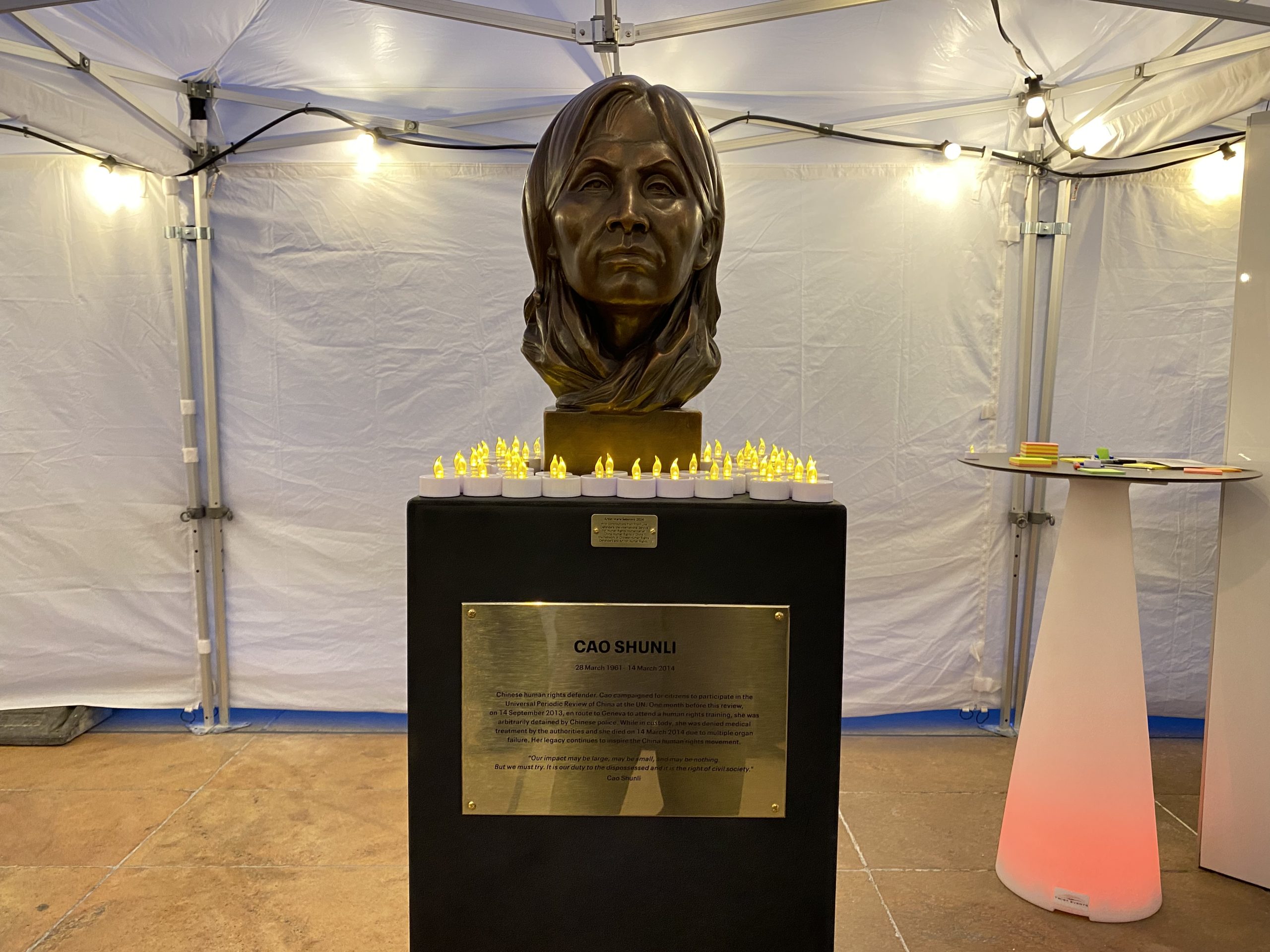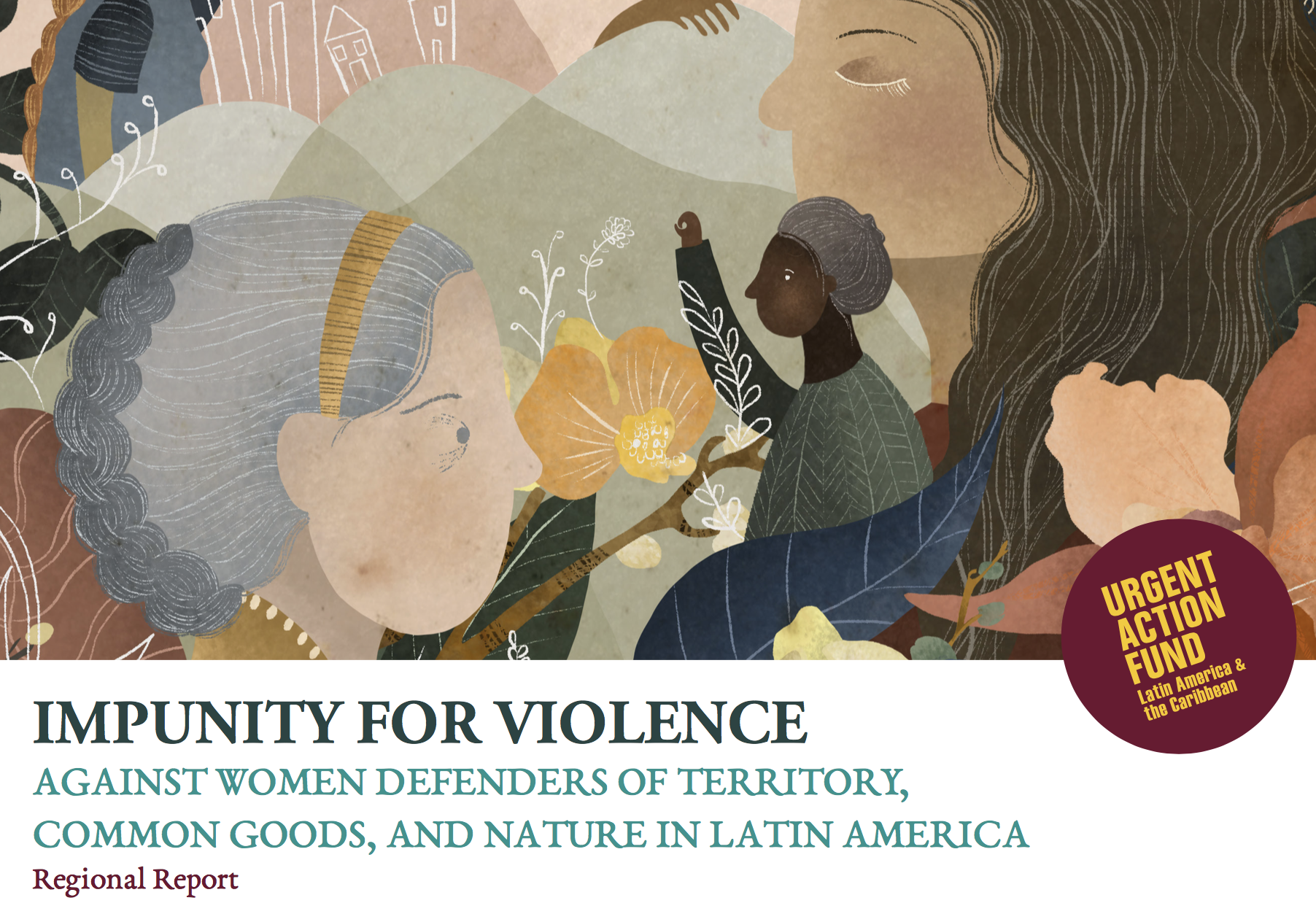The Regional Report Impunity for Violence Against Women Defenders of Territory, Common Goods, and Nature in Latin Americareflects the collective effort of the Urgent Action Fund for Latin America and the Caribbean – UAF-LAC, together with fourteen organizations[1]committed to the promotion and defense of women’s human and environmental rights and the integral protection of women activists and communities that confront the extractivist model in Latin America.
As they confront not only powerful economic and political interests, but the systematic and specific violence against them, women environmental activists face particular risks, threats and attacks, such as sexual violence and other gender-related offenses. However, documentation on this issue is insufficient and lacks of a feminist and intersectional approach.
For this reason, we have documented the situation of thirteen activists[2]from nine countries, subjected to individual and collective criminal charges, threats, attacks, and other forms of harassment, up to the most extreme form of repression-physical extermination in the form of femicide. These cases show the alarming situation of women defenders, their fight against impunity for the attacks they receive and the judicial operator’s lack of recognition of the standards to be used against impunity.
Impunity involves much more than an absence of punishment in criminal acts. It implies that there is no due legal process, or that the law has not been consistently applied, that victims do not know the truth about the attacks they suffered and do not have access to reparations. Therefore, it implies that the State does not adopt measures to prevent their repetition. It installs terror and hopelessness in communities and organizations and ensures a reproduction of privilege and injustice in all of its dimensions and a continuity of the status quo.
From a feminist perspective, in our region perpetuation of this phenomenon is due to the following conditions a) the collusion between the State and companies[3]; b) the continuum and spirals of gender-based violence; c) structural racism, that implies double discrimination against indigenous and afro-descendant activists; d) the absence of recognition for women defenders’ work which diminishes the importance of identifying the context in which these crimes occur and the intellectual authors and d) the deficiency of effective protection mechanisms for women defenders that take on account their specific vulnerability, including violence inside their communities and organizations.
Based on the cases, we highlight some alarming facts. For environmental WHRDs justice has two sides: on one hand there is a systematic absence of diligent investigation; usually, the complaints lodged by women defenders are dismissed and not continued; on the other hand, justice operates diligently to criminalize and neutralize them. Furthermore, there is a worrying incompetence of officials to address women activists’ complaints about sexual violence that contrasts with the frequency which with this type of violence is exercised by different state agents against women defenders. Finally, we alert about the lack of investigations, and the fact that, when they occur, they are usually conducted based on misogynist and racist stereotypes.
With this joint work we want to honor and dignify the legacy of resistances of those women who care for and protect territory and nature in Latin America. We want to amplify their voices and demands and broaden the support and commitment of states, regional and international human rights protection bodies and civil society to ensure women defenders’ lives, integrity and sustainable activism.
Check the complete report, executive summary and infographics here: http://www.urgentactionfund-latinamerica.org/publicaciones
[1]This report has been prepared through a joint effort between Urgent Action Fund for Latin America and the Caribbean, the Association for Women’s Rights in Development (AWID) , JASS Just Associates , the Mesoamerican Women Human Rights Defenders Initiative5 , the Movimento dos Atingidos por Barragens (Movement of People Affected by Dams MAB, acronym in Portuguese) of Brazil6 , Civic Council of Popular and Indigenous Organizations of Honduras (Concejo Cívico de Organizaciones Populares e Indígenas de Honduras- COPINH)7 , the Commission of Relatives of Victims of the Curuguaty Massacre (Comisión de Víctimas de la Masacre de Curuguaty) in Paraguay, Ecuador’s Assembly of the People of the South (Asamblea de Pueblos del Sur), the Women’s Movement of Santo Tomás (Movimiento de Mujeres de Santo Tomás) in El Salvador, the Living Rivers Movement (Movimiento Ríos Vivos) of Colombia, the Inter-Church Commission for Justice and Peace (Comisión Intereclesial de Justicia y Paz)8 of Colombia, the Center for Justice and Human Rights of the Atlantic Coast of Nicaragua9 , the Fund for Women of the South (Fondo de Mujeres del Sur)10, the Ancestral Mapuche Community of Quillempám (Comunidad Ancestral Mapuche de Quillempám), and the Anti-Racist Lesbian-Feminist Land and Territory Working Group (Grupo de Trabajo Lesbofeministas Antirracistas Tierra y Territorio), who provided inputs and the documentation of cases showing patterns of impunity in different countries
[2]The documentated cases are: Sonia Sánchez. Women’s Environmentalist Movement of Santo Tomás (MOMUJEST – Movimiento de Mujeres Ambientalistas de Santo Tomás)- El Salvador; Isabel Cristina Zuleta- Movement of People Affected by Dams Living Rivers- Antioquia (Movimiento de Afectados por Represas Ríos Vivos- Antioquia) – Colombia; Lucia Aguero, María Fani Olmedo, and Dolores López- Paraguay; Luisa Lozano and Karina Montero: Defense of the right to land and the collective rights of indigenous peoples in Ecuador; Yolanda Oquelí – Resistance to mining in Guatemala; Juana Bilbano and Lottie Cunningham Center for Justice and Human Rights of the Atlantic Coast of Nicaragua – Nicaragua; Berta Cáceres, Civic Council of Popular and Indigenous Organizations of Honduras – (Consejo Cívico de Organizaciones Populares e Indígenas de Honduras- COPINH-); Nilce de Souza – Movement of People Affected by Dams – MAB- Brazil; and “La Negra” Macarena Valdés – Newen-Tranguil Community – Chile.
[3]This collusion is reflected on the legal frameworks and policies that encourage foreign investment regardless of human rights respect, the violation of the right to free, prior, and informed consent, militarization and the biased actions of judges and attorneys.




